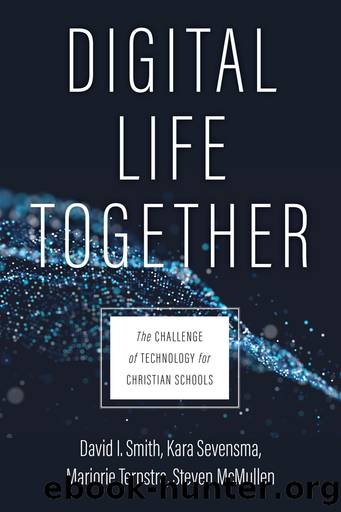Digital Life Together by Smith David I.;Sevensma Kara;Terpstra Marjorie;McMullen Steven;

Author:Smith, David I.;Sevensma, Kara;Terpstra, Marjorie;McMullen, Steven;
Language: eng
Format: epub
Publisher: Wm. B. Eerdmans Publishing Co.
Part 4 Summary
This part of the book explored how the Modern Christian Schools community has understood and worked to put into practice the task of Christian discernment with technology. Here we looked at the interaction between discernment themes and an emphasis on digital citizenship and asked how the community has approached concerns about maintaining safe boundaries.
â¢The idea of Christian discernment has a significant theological heritage. According to Nouwen, discernment is âa spiritual understanding and an experiential knowledge of how God is active in daily life that is acquired through disciplined spiritual practice.â1 It is not just an individual affair, and it is not just focused on moral questions. It is a communal Christian practice aimed toward knowing how our choices might affect our ability to love God and neighbor. Thinking about technology in connection with Christian discernment requires a focus on our relationship with God, our relationships with one another, our moral and spiritual formation, and our vocation and mission.
â¢A second source of ideas for approaching ethical boundaries in relation to digital technology is provided by work on digital citizenship. Digital citizenship is concerned with digital ethics (including copyright, cyberbullying, and privacy), media and information literacy, the capacity to effectively participate in a digital society, and the potential of digital media for fostering critical reflection and social change. The concerns of digital citizenship and discernment overlap in their common focus on how we treat one another, yet they are not identical. Discernment draws on our specific faith commitments, our spiritual formation, and our relationship with God. Digital citizenship is more developed in terms of educational frameworks and practical tools.
â¢Close examination of a decade of policy documents and professional development records shows a consistent emphasis on the need for students to learn Christian discernment with technology. Early school conversations reflected the breadth of themes present in the idea of Christian discernment. Over time, perhaps in part because of the pressure and practical accessibility of digital citizenship frameworks, the meanings connected with talk of discernment in school documents tended to narrow to a focus on ethical behavior and information literacy. A regular return to theological sources and core commitments to clarify what was intended seems needed if the scope of key ideas is not to be narrowed by the pressures experienced during rapid processes of change.
â¢One critical question raised by some members of the parent community concerned whether students in the technology program were getting too much screen time. Close examination of actual screen time in class suggests that studentsâ screen time per se is not excessive. Using their devices in the context of a school community where there are limits on entertainment and social media may offer these students opportunities to practice good technology habits. Given pressures in the wider culture and the increasing use of personal devices such as smartphones, it is possible that some students are using their devices excessively. However, our data do not offer support for the idea that the schoolsâ technology program itself was a cause of harmful quantities of screen time.
Download
This site does not store any files on its server. We only index and link to content provided by other sites. Please contact the content providers to delete copyright contents if any and email us, we'll remove relevant links or contents immediately.
The Art of Coaching Workbook by Elena Aguilar(48339)
Trainspotting by Irvine Welsh(20083)
Twilight of the Idols With the Antichrist and Ecce Homo by Friedrich Nietzsche(17721)
Fangirl by Rainbow Rowell(7843)
Periodization Training for Sports by Tudor Bompa(7342)
Change Your Questions, Change Your Life by Marilee Adams(6658)
This Is How You Lose Her by Junot Diaz(5800)
Grit by Angela Duckworth(4747)
Red Sparrow by Jason Matthews(4686)
Asking the Right Questions: A Guide to Critical Thinking by M. Neil Browne & Stuart M. Keeley(4599)
Paper Towns by Green John(4178)
Room 212 by Kate Stewart(4116)
Ken Follett - World without end by Ken Follett(3983)
The Sports Rules Book by Human Kinetics(3597)
Housekeeping by Marilynne Robinson(3421)
The Motorcycle Diaries by Ernesto Che Guevara(3345)
Introduction to Kinesiology by Shirl J. Hoffman(3305)
Exercise Technique Manual for Resistance Training by National Strength & Conditioning Association(3298)
Double Down (Diary of a Wimpy Kid Book 11) by Jeff Kinney(3286)
